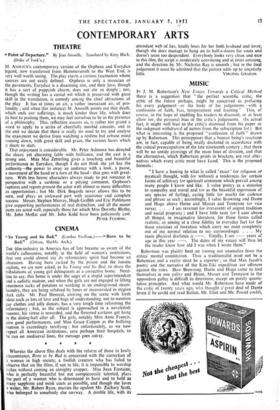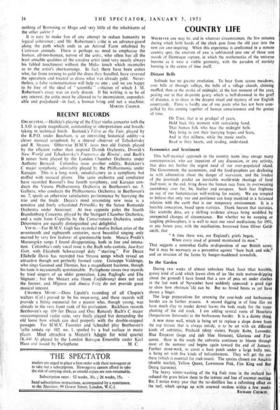MUSIC
IN J. M. Robertson's New Essays Towards a Critical Method there is a suggestion that " the perfect scientific critic, the critic of the future perhaps, might be conceived as prefacing his every judgement—or the body of his judgements—with a confession of faith, bias, temperament and training." This, of course, in the hope of enabling his readers to discount, or at least allow for, the personal bias of the critic's judgements. (In actual fact, it might well lead to the critic's dismissal from his paper or the indignant withdrawal of names from the subscription list.) But what is interesting is the proposed " confession of faith " drawn up by Robertson. This presupposes that a human being's reactions are, in fact, capable of being neatly docketed in accordance with the critical preoccupations of the late nineteenth century ; that there will be no untidy crossings of the main lines of division, and that the alternatives, which Robertson prints in brackets, are real alter- natives which every critic must have faced. This is the proposed formula:
" I have a leaning to what is called ' exact' (or religious or mystical) thought, with (or without) a tenderness for certain forms of arbitrary (or spiritual) sentiment which prevail among many people I know and like. I value poetry as a stimulus to sympathy and moral zeal (or as the beautiful expression of any species of feeling), caring little (or much) for cadence and phrase as such ; accordingly, I value Browning and Dante and Hugo above Heine and Mussel and Tennyson (or vice versa). . . . I am reverent (or irreverent) of august tradition and social propriety ; and I have little taste (or I care above all things), in imaginative literature, for those forms called realistic, as aiming at a close fidelity to everyday fact (or for those exercises of invention which carry me most completely out of my normal relation to my surroundings). . . . My main physical diathesis is Finally, I am — years of age in this year The dates of my essays will thus let the reader know how old I was when I wrote them."
Robertson was plainly bent on ironing out anomalies from the critics' mental constitution. Thus a traditionalist must not be .a Bohemian and a realist must be a reporter ; so that Max Jacob's poetry and the narrative of the Kon-Tiki expedition are offences against the rules. How Browning, Dante and Hugo came to find themselves in one galore and Heine, Musset and Tennyson in the opposition galley is difficult to determine, except on purely quanti- tative principles. And what would Mr. Robertson have made of the critic of twenty years ago, who thought a' great deal of Dante (even if he could not read Italian, Mr. Eliot and Mr. Pound could),
nothing of Browning or Hugo and very little of the inhabitants of the other galere ?
It is easy to make fun of any attempt to reduce humanity to logical coherence ; and Mr. Robertson's critic is an advance-guard along the path which ends in an Animal Farm inhabited by Cartesian animals. There is perhaps no need to emphasise the human, all-too-human, nature of the critic, who often has all the least amiable qualities of the creative artist (and very nearly always his fabled touchiness) without the Midas touch which reconciles us to the artist's shortcomings. In fact, there have been critics who, far from turning to gold the dross they handled, have reversed the operation and treated as dross what was already gold. Never- theless, a false systematisation will help no one ; and we are happy to be free of the ideal of " scientific " criticism of which J. M. Robertson's essay was an early dream. If his writing is to be of any interest, the critic must be allowed to he inconsistent, unpredict- able and prejudiced—in fact, a human being and not a machine. MARTIN COOPER.







































 Previous page
Previous page